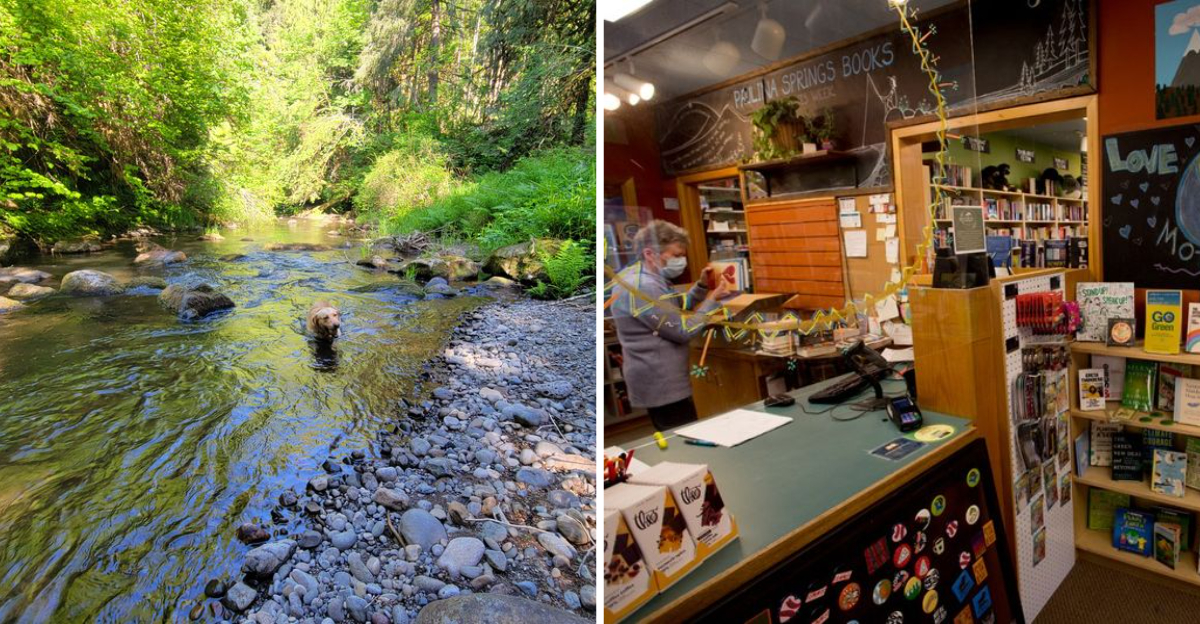
When I escaped the city buzz for Oregon’s quaint small towns, I never expected to completely transform my daily rhythm. These hidden gems, tucked between misty mountains and peaceful coastlines, taught me more about intentional living than any self-help book ever could. The slower pace, community connections, and nature-centered lifestyles in these towns offer valuable lessons that visitors like me carry back to our hectic urban lives.
1. Morning Rituals Without the Rush
Waking up in Joseph, nestled against the Wallowa Mountains, I witnessed locals starting their day without frantic alarms or hurried commutes. Instead, they embraced slow mornings with intention – watching the sunrise paint Eagle Cap wilderness while sipping locally roasted coffee.
Back home, I’ve abandoned my three-alarm wake-up system. The simple act of giving myself an extra twenty minutes each morning has reduced my anxiety levels dramatically. I prepare breakfast mindfully rather than gulping down something convenient while rushing out the door.
Though I can’t recreate Joseph’s mountain views from my apartment, I’ve created a small morning sanctuary by my window. This quiet morning ritual has become sacred – a lesson in presence I never would have discovered without stepping into Oregon’s slower rhythm.
2. Front Porch Culture Builds Real Community
While wandering through Jacksonville’s historic district one evening, I noticed something extraordinary – people actually using their front porches. Neighbors called greetings across streets, spontaneous conversations flourished, and strangers (including me) received friendly waves.
Unlike my apartment building where neighbors avoid eye contact in elevators, Jacksonville residents prioritize these casual interactions. They understand something vital about human connection that many of us have forgotten in our efficiency-obsessed world. Since returning home, I’ve started sitting on my building’s stoop rather than hiding inside.
Gradually, I’ve met neighbors I’ve lived beside for years. This simple shift – moving social life from private backyards to public-facing spaces – creates the community fabric that makes small Oregon towns so appealing and supportive.
3. Seasonal Eating Transforms Your Relationship With Food
If you’ve ever tasted a strawberry from the Hood River Valley in June, you’ll understand why locals plan their meals around harvest schedules instead of convenience. My first farmers’ market visit in Hood River completely changed my understanding of seasonal eating.
Farmers explained how waiting for local growing seasons creates anticipation that makes food more satisfying. Rather than expecting every fruit and vegetable year-round, locals celebrate each food in its proper time – making meals events rather than mere sustenance. Though challenging in my urban setting, I’ve committed to shopping at weekend farmers’ markets.
The rhythm of cooking what’s locally available has reconnected me with nature’s cycles. I’ve discovered that strawberries in season taste infinitely better than shipped versions, and waiting makes them special again – a forgotten pleasure in our everything-now culture.
4. Embracing Weather Instead of Fighting It
During my stay in Yachats, I watched in amazement as locals ventured out for their daily beach walks regardless of the coastal weather. “There’s no bad weather, just inappropriate clothing,” my B&B host explained while handing me a raincoat.
Where I’m from, rain means canceled plans and indoor retreats. However, Oregonians in small coastal towns maintain their rhythms through all seasons – celebrating rather than merely enduring each weather pattern. They understand that connecting with natural elements grounds you in place and time. Though initially reluctant, I’ve started walking regardless of forecast, discovering unexpected beauty in previously avoided conditions.
Morning fog transforms familiar streets into mysterious landscapes. Gentle rain creates a meditative soundtrack. By stopping my weather complaints and adapting instead, I’ve reclaimed countless hours previously spent hiding indoors – perhaps the most practical lesson these weather-wise Oregonians taught me.
5. The Art of Doing Nothing Productively
Sitting beside the Santiam River in the tiny town of Mill City, I watched an elderly gentleman spend three hours simply observing the water. He wasn’t reading, checking a phone, or even fishing – just being present with the flowing river. Initially, I found this baffling.
Where I’m from, such stillness would be considered wasted time. Yet throughout Oregon’s small towns, I encountered people who had mastered this productive form of doing nothing – a deliberate pause that restores rather than depletes. Learning this skill hasn’t been easy for my achievement-oriented mind. Starting with just five minutes of undistracted observation, I’ve gradually built my “doing nothing” muscle.
The mental clarity gained from these pauses has ironically made me more effective during working hours. Small-town Oregonians understand something profound – that human minds, like fields, need fallow periods to remain fertile and creative.
6. Redefining Success Through Sufficiency
My conversation with a former tech executive who now runs a small bookshop in Sisters completely restructured my definition of success. “I have enough,” she said simply when I asked if she missed her higher salary. “Enough time, enough connection, enough purpose.”
Throughout Oregon’s small towns, I encountered people who had intentionally chosen lives with lower financial returns but richer personal rewards. They measured wealth through free time, community involvement, and connection to place rather than accumulation or status. While I haven’t abandoned my career, I’ve stopped chasing promotions that demand more hours. I’ve calculated my personal “enough” number – the amount that provides security without requiring life sacrifice.
This mindset shift has freed me to decline projects that don’t align with my values. Perhaps the most profound lesson from Oregon’s small towns is this radical redefinition of success – one based on sufficiency rather than excess.
Dear Reader: This page may contain affiliate links which may earn a commission if you click through and make a purchase. Our independent journalism is not influenced by any advertiser or commercial initiative unless it is clearly marked as sponsored content. As travel products change, please be sure to reconfirm all details and stay up to date with current events to ensure a safe and successful trip.